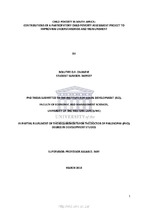| dc.description.abstract | Involving children in studies about complex social issues like poverty is not common
practice. While child poverty is a subjective matter, most studies rely on adult opinions to
conceptualize and measure it. This study addressed this problem by obtaining children’s
conceptualizations of poverty and the dimensions they deem important for child poverty
measurement vis-à-vis existing studies. With majority of poor children living in developing
countries, and a context where historical structures of colonialism and apartheid preserve
the incidence of poverty along racial divides, South Africa presents a fitting example for this
study.
A mixed methods research design and methodology entailing participatory child poverty
assessment was adopted. Methods used include drawing, storytelling/writing, sentence
completion, scenario vignettes, thematic questioning, focus group discussions and
interviews. The output from this, guided analysis and measurement of child poverty using
South Africa’s nationally representative survey - the National Income Dynamics Study
(NIDS), designed to track and understand poverty dynamics in South Africa. Findings from
both qualitative and quantitative phases were theoretically framed and analysed using an
integration of Sen’s Capabilities Approach and Children’s Rights.
Findings revealed children’s concepts of poverty as: (i) basic needs/absolute deprivation (ii)
monetary inadequacy/material lack, (iii) relative deprivation (iv) capability deprivation (v)
psychological strain and (vi) social exclusion, thus reinforcing existing notions of poverty.
The children extended the discourse on essential dimensions for measuring child poverty by
proposing Family Belonging, Appearance, Jobs & Employment, and Social Protection: Child
Support Grant (CSG) and Safety as new/additional dimensions. These were identified
alongside conventional dimensions of Education, Health, Food, Water, Housing, Finances,
Material Possessions, Technology, Play/Leisure and Transportation used in existing studies.
Other findings included that in South Africa, poverty has a racial face worn by Black Africans
and Coloureds. Also, in identifying structural, personal and external factors as causes of
poverty, apartheid was fingered as the fundamental and sustaining cause of poverty, with
personal and external factors emerging only as secondary. The children’s proposed solutions
to poverty included an emphasis on the indispensable role of government, the importance
of social policy provisions and comprehensive social protection, and the value of a truly
equitable society. Regarding coping strategies to manage poverty, at the individual level,
sharing food with friends, learning to persevere and deferring the fulfilment of certain nonfood
needs were popular approaches. At the household level, strategies including cutbacks,
borrowing, sharing and resource pooling were adopted to manage food and financial
shortages. These findings contribute to improving contextual understandings of child
poverty in South Africa.
By using children’s perspectives to affirm and expand existing approaches to conceptualising
and measuring child poverty, the results of this study make a significant contribution to child
poverty assessment. The qualitative findings also highlighted significant areas for expanding
the range and quality of data collected in NIDS, thus improving the quantitative process of
poverty measurement. It is noteworthy that the study also proves, secondarily, that children
are capable of contributing new knowledge, even on complex issues when their unique
experiences and perceptions are perceptively explored. By extension, the study proffers
insights which can be adapted to other countries, developing or developed. | |

